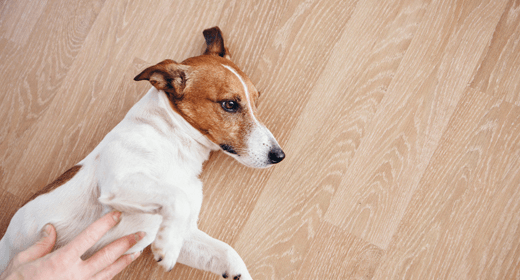

Bringing a furry friend home is one of the greatest things you will do. If you are someone who has been longing for a furry companion, you should wait no more... however, only if you are confident that you can take complete care of this four-legged angel. Puppies need love and care, so as their caregivers, you need to help them grow into happy and healthy dogs.
Stay by your pet’s side throughout its growing stage. This is that time of its life where you need to do more than just provide food, love, and fun times; you must understand dog nutrition, follow the vaccination schedule, and potty train your puppy. Sparing some time and energy to provide your pet with basic puppy care can help you build a loving relationship with your pooch. So, let us explore a few things you can look into while nurturing a puppy. This basic puppy care guide will also keep you informed with what to expect in the first few months of being a caregiver.
Wondering what to know about taking care of a new puppy? Let us start with the most basic things like puppy proofing your house. That is right. Puppies and babies fall in the same category: delicate and fragile! You need to be careful about their surroundings and make sure that there is nothing hazardous around. Puppies are naturally curious. Make sure they do not encounter things like chemicals, electrical cords, harmful houseplants, valuables, and especially breakables. You also need to get necessary pup supplies like a feeding bowl, collar, leash, and more. Set up a cosy corner for your puppy to rest in!
Choosing the right puppy food is of paramount importance. You must pick out puppy food that is specifically formulated for growing puppies as it needs the right kind of nutrients to grow stronger. So, avoid adult dog food if your pet is still a pup.
Not sure when to make a switch to adult dog food? Well, it totally depends on the breed size. If you have a small or medium breed dog, you can switch to dog food once it turns 9 to 12 months old. If you have a large breed dog, continue feeding puppy food until it turns 12 to 24 months old. Apart from that, make sure your pup always has access to fresh and clean water!
This is what a typical puppy feeding schedule would look like:
At IAMS™, we offer a range of puppy as well as adult dog food that nourishes your furry friend with vitamins, minerals, proteins, and other essential nutrients. Our products are made with premium-quality ingredients to ensure that your dog enjoys every bite of its food.
Taking your furry friend to the vet is the most important part of taking care of a puppy. Your dog’s first visit to the vet will help you learn about your dog’s overall physical health. Vet visits will also keep you informed about the vaccination schedule. In fact, it is recommended to make a list of all questions that you may have. This list should include topics like:
Puppies should meet a variety of different people, dogs, objects, and situations – all in a positive way. The most important time for pups to socialise is between three and 12 weeks of age, however, it should continue throughout a puppy’s development. As pet parents, you can take your pooch to puppy classes as it provides a great opportunity to socialise puppies.
You can get started with potty training from the day one. This will help inculcate basic bathroom manners in your dog and will save you from cleaning the floor every time your pooch excretes. So, pick a bathroom spot outside your house and take your pup to the same place whenever it is potty time. Praise it right after it is done. You can also reward it with treats. However, under no circumstances must a puppy be yelled at since it may ignite fear.
The best way to train is to reward good behaviour and ignore unwanted behaviour. It is never too early to begin training a puppy, but owners must remember that very young puppies become tired or distracted easily so training sessions should be kept to a short duration.
Dogs are prone to losing tooth, bad breath, and periodontal diseases. Moreover, they are good at hiding their dental pain. Hence, owners should introduce some form of oral care for their puppy as early as possible. Consult your vet to ensure that you pick the best dental care option for your pooch.
Amounts of exercise should be controlled for puppies during growth. They should not be forced to exercise beyond the amount of time they would engage in with another puppy of the same age. Moreover, your furry friend must be allowed to rest when they need to. So, instead of offering a one long playtime period, go for two short walks.
Every first-time dog parent must know the following tips to take care of a puppy:
Puppies are full of energy. And they can drive you crazy if their energy isn’t utilised. Hence, make sure that you train and exercise with your baby dog every day. Go for walks, play fetch, and praise it for good behaviour. This will condition your puppy to think that good behaviour is rewarded.
Dogs do not know how to live in a house. As dog parents, we need to teach them some basic manners. Start by teaching your pet its name and then move on to potty training. Dogs are social beings; hence, do not forget to teach your dog to stay calm and polite in public places.


Bloat can affect any dog; however, it is observed in deep-chested, larger breeds more frequently than in others. Unfortunately, you will find that many dog owners are completely unaware of this ailment until it starts to endanger their pet’s life.
Bloat can affect any dog; however, it is observed in deep-chested, larger breeds more frequently than in others. Unfortunately, you will find that many dog owners are completely unaware of this ailment until it starts to endanger their pet’s life. Therefore, all pet owners should be aware of bloat and how to spot and respond to symptoms of bloat in dogs. So, here’s all you need to know about bloating in dogs.
Bloat is a life-threatening condition that acts rapidly and can lead to death within hours if not recognised and treated immediately. Unfortunately, the cause of bloat remains unknown at this time.
The scientific term for bloat is gastric dilatation-volvulus or GDV. Bloat is characterised by rapid and abnormal expansion of the stomach with gas (dilatation). This can be followed by rotation of the stomach (volvulus). This rotation closes both the entry to and exit from the stomach. The blood vessels also are closed, and the blood flow is restricted.
What follows is an increase in pressure inside the stomach and compression of the surrounding organs. Eventually, shock will occur as a result of the restricted blood flow. Here are a few key facts about bloat:
Bloat is a true medical emergency, and early identification and treatment is critical for survival.
In the early stages of bloat, the dog will be very uncomfortable. You might see it pacing and whining or trying unsuccessfully to get into a comfortable position. It might seem anxious, might lick, or keep staring at its stomach, and might attempt to vomit, without success.
Other indications of bloat can include weakness, swollen abdomen, and even signs of shock. Signs of shock are increased heart rate and abnormally rapid breathing.
If you notice these signs of bloat in dogs, call your veterinarian immediately!
This occurs due to gas getting trapped in the stomach region.
Gastrointestinal problems in dogs can cause excessive salivation, including esophageal diseases like megaesophagus.
Pacing and restlessness are typical signs of bloating. Your dog may even groan or whine when you press on their belly.
An abnormal swelling due to gas in your dog’s stomach can also cause respiratory distress along with a twisted belly.
Bloating can put strain on the diaphragm, a delicate muscle that divides the chest from the abdomen. This ends up making heartbeats shorter and breathing difficult.
Although veterinarians don't know what causes bloat in dogs, there are numerous factors that increase a dog's risk for this condition. These include:
These suggestions could help in preventing bloat in dogs. However, they are based on suspected risk factors and are not guaranteed to prevent the onset of bloat.
All cases of bloat in dogs require prompt medical intervention. The condition can be treated if it gets addressed quickly. In case of a simple bloat, where the dog's stomach has not twisted, the pet may be treated without any medication. They may be given fluids and certain therapies. If discovered in its early stages, other types of bloats such as GDV, may also be treatable. Surgical intervention may also be used for treatment in certain cases.
Releasing the trapped air and gas will relieve pressure on the surrounding organs and prevent the stomach's tissue from degenerating. A tube and stomach pump can be used for this; however, surgery may be required on occasion. This can aid in stomach unwinding or curing GDV in dogs.
Additionally, electrolyte-fortified intravenous fluids are also administered to improve blood flow to vital organs. In many cases, this necessitates the use of potent painkillers, antibiotics, and medications to treat the decreased blood supply to the heart due to bloating.
As soon as the dog is steady, surgery is carried out. Your veterinarian may need to untwist the dog's stomach and remove any stomach wall tissue that might have died from a lack of blood supply. The veterinarian will also perform a treatment known as a gastropexy to suture the stomach to the body wall. As a result, the likelihood of the stomach rotating in the future decreases significantly; thus, preventing bloat in dogs.
Another way you might help prevent bloat is by feed a high-quality, easily digestible food with normal fibre levels.
Feeding management offers the best method available for reducing risk until the exact cause of bloat can be identified. Although not 100% effective, these measures can reduce the number of dogs that face this serious, life-threatening condition.
IAMS™ dog food stands out as a superior and highly digestible choice for your furry companion.
If you're looking for the perfect dog for you, try our Dog Breed Selector today and enjoy a lifetime of tail-wagging joy.